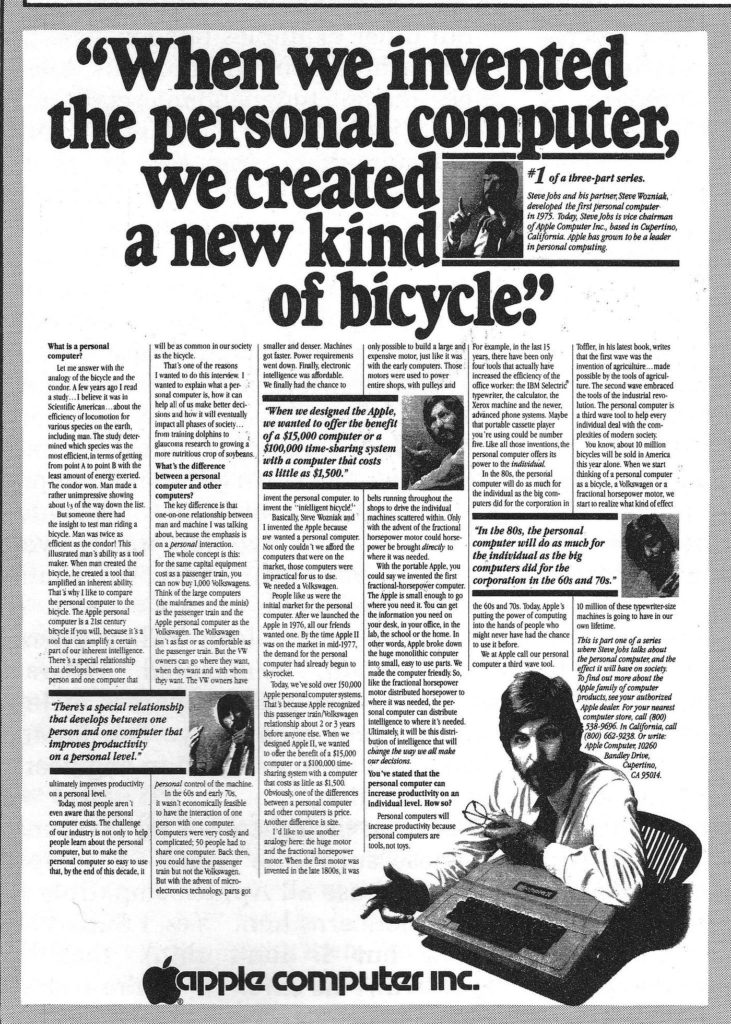In 1981, Steve Jobs, the co-founder of Apple, used a memorable phrase to describe the potential of personal computers. He called them the “bicycle for the mind”. The phrase captured the idea that computers, like bicycles, could enhance human intelligence and creativity.
At the time, personal computers were still in their infancy. But Jobs saw the potential of computers to transform the way we think and create. He believed that computers could become the most remarkable tool that humans had ever come up with.
The metaphor of the bicycle for the mind has since become a popular way to describe the transformative power of technology. Just as bicycles allowed humans to move faster and farther than they ever could before, computers could now allow us to process information and create things that were once impossible. Moreover, computers could remove the drudgery of work, freeing us for the truly human tasks of thinking and creating.

One of the key ways that computers have transformed the way we think and create is by making information more accessible. Before the internet, knowledge was often limited to books and other physical media. But with the rise of the internet, information became available to anyone with an internet connection. This democratization of knowledge has made it easier for people to learn about new subjects, share ideas, and collaborate on projects.
Computers have also transformed the way we communicate with each other. With email, instant messaging, and social media, we can now connect with people from all over the world in an instant. This has made it easier for us to form communities and collaborate on projects, no matter where we are in the world.
Another way that computers have transformed the way we think and create is by providing powerful tools for creation. With software like Adobe Photoshop and Illustrator, anyone can create stunning graphics and designs. With video editing software like Final Cut Pro and Avid Media Composer, anyone can create professional-quality videos and even entire movies. And with programming languages like Python and JavaScript, anyone can create software and web applications.
Moreover, computers have democratized access to powerful tools that were once only available to a select few. In the past, access to expensive software and hardware was limited to large corporations and wealthy individuals. But today, anyone with a computer and an internet connection can access powerful tools for design, programming, and other creative endeavors.
Looking to the future, the democratization of AI and new forms of technology is poised to have an even greater impact on the world. One area where this is already happening is in healthcare. Personal health technology, or “digital health”, is a rapidly growing field that aims to give people more control over their own health through the use of technology.
Digital health tools include wearable devices that track fitness and health metrics, mobile apps that provide personalized health coaching and advice, and telemedicine services that allow patients to consult with doctors remotely. And AI tools like ChatGPT promise to free physicians to spend more time with patients and help individuals research their own solutions. By democratizing access to these tools, digital health has the potential to improve health outcomes for people around the world, regardless of their income or location.
In conclusion, the phrase “bicycle for the mind” captures the transformative power of personal computers to enhance human intelligence and creativity and we’re poised for the next phase, more like a “rocketship for the mind.” Computers have made information more accessible, transformed the way we communicate, provided powerful tools for creation, and democratized access to technology. As technology continues to advance, we can expect even more transformative changes in the way we think and create, as well as in our ability to take control of our own health.
